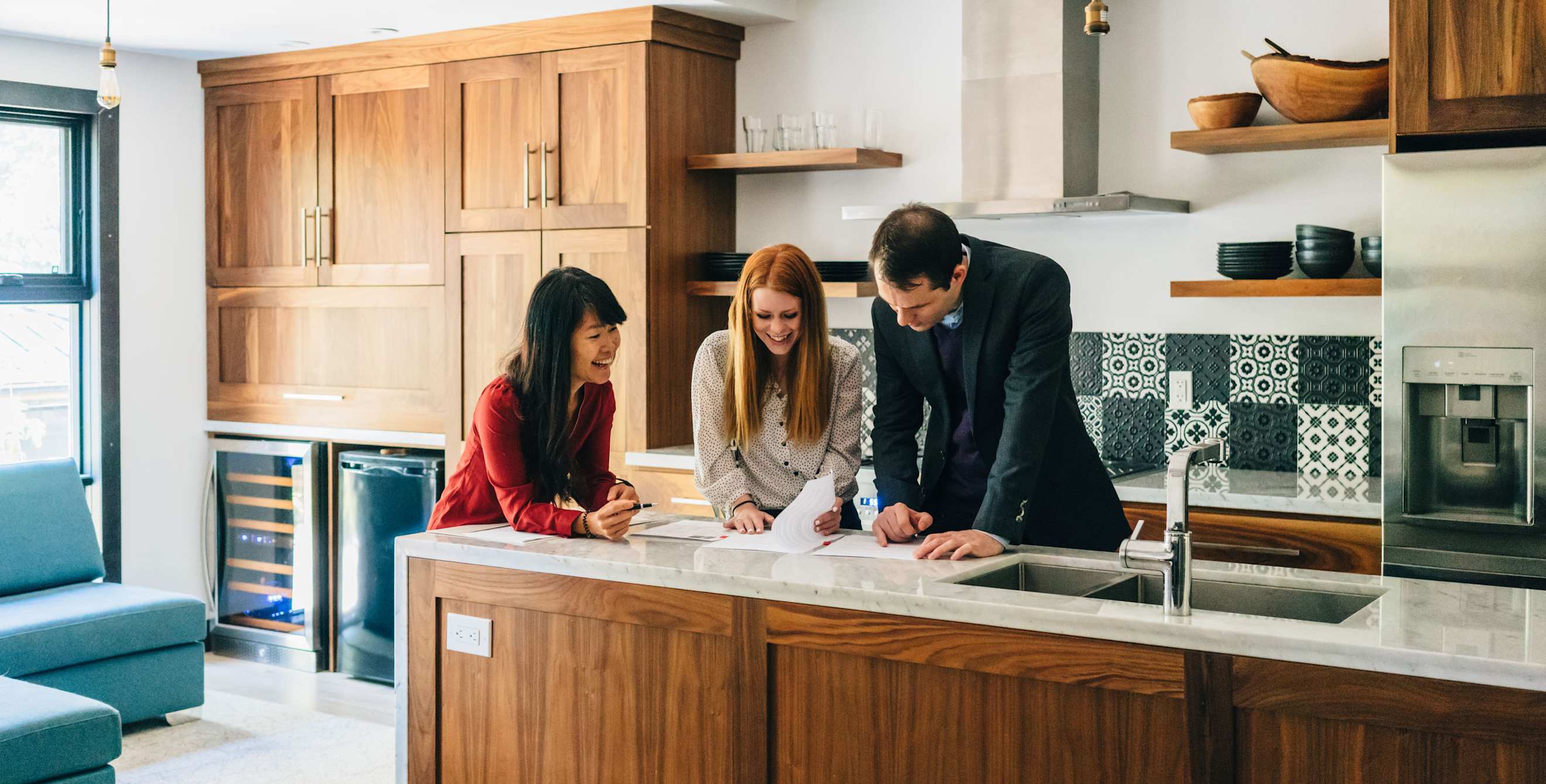
What Every First-Time Home Buyer Needs to Know
Demystify the process of buying a house so you're ready to sign for your dream home.

Buying your first home is a major financial decision—most likely the biggest of your life so far. But this milestone moment is about so much more than money. Purchasing a home is both a logistical decision and an emotional one. After all, this is where you’ll live for the next several years. You’ll have to consider what type of living situation will lead to your happiness now, and in the future. Will you have (more) children? Do you value a short commute or a sprawling lawn? How can you balance your mortgage payment and your love of trying the latest restaurant?
Small wonder that many first-time homebuyers fluctuate between excitement and anxiety, confidence and feeling overwhelmed. Not only is the scale of this purchase immense (you'll sign papers for a loan that stretches 15 or 30 years into the future), but the jargon and process can feel intimidating.
Don't let that stand in the way of your becoming a homeowner—we've assembled tips from experts on how to master the required paperwork, determine the right house for your finances and lifestyle, and land the home of your dreams.
Start early with a deep dive into your financial life.
Before you commit your Saturdays to open houses, spend time reviewing your finances, from what you make to what you owe.
“Take a big-picture overview of your personal financial situation, looking at your assets, looking at any liabilities you have, and figuring out if you are on track for common goals like saving for retirement—just to get a sense of where you stand financially,” recommends Eric Tyson, author of Home Buying for Dummies.
Yes, this is more tedious than gazing at photo galleries on real estate websites, but this information will shape your search and ensure you’re looking at the right homes for your budget and lifestyle. Here’s what to look at:
1. Credit Score
Check your credit score and get a credit report early on, advises Tyson. “You are entitled to a free copy of your credit report once a year from each of three major rating agencies,” he says, noting it’s a good idea to know your score before you apply for a mortgage. That's because your credit score plays a big role in the interest rate you'll get on your mortgage, says Adam P. Smith, president and CEO of The Colorado Real Estate Finance Group, Inc. Don’t despair if it’s low—paying off old, outstanding bills or paying down debt can help improve this number.
2. Savings
Typically, the down payment is 3.5-10 percent of the price of the home, with the gold standard around 20 percent. That can be a significant amount! First-time home buyers, however, are eligible for a Federal Housing Administration loan, which requires, depending on your credit score and other factors, a down payment as low as 3.5 percent. Even with a lower down payment, however, you'll still need to have money in your savings account to use for closing costs, homeowner’s insurance, and the other non-mortgage expenses of homeownership.
3. Your Monthly Budget
As well as looking at the big picture of your finances, create a monthly budget, and compare your take-home to your spending (including any debt payments, retirement savings, and expenses).
“The general rule of thumb is that you don’t want your mortgage payment to exceed 30 percent of your gross income,” says Anthony N. Badillo, CFP®, ChFC®, EA, and Lead Planner at Gen Y Planning, who notes that as a financial advisor, he encourages clients to opt to spend just 15 to 20 percent of gross income on mortgage payments. There are, after all, more costs to home ownership than your mortgage—such as insurance, property taxes, and interest.
Examining your finances brings clarity and structure to your home search. You may find yourself with a to-do list of projects: adjusting your budget so you can save more for your down payment, improving your credit score, etc. Or, it may reveal that given where you want to live, renting makes more sense. In competitive markets, typically seen on the coasts of the country, often renting is more affordable and buying might mean devoting hours of your day to a commute.
If you do decide to move forward in the home-buying process, you won’t regret this time spent combing through your finances. “Going out and buying a home and committing to that much of a financial purchase sends shockwaves through your household finances,” says Tyson. It’s good to know where you stand, he says, before you start your home hunt.

Get pre-approved to show sellers you’re a serious buyer.
With your financials in order, you’re ready to start thinking about mortgages. One easy entry point into the world of lenders: Get pre-approved for a mortgage by a lender. Doing so can be sensible, says Tyson, since it shows property owners that you’re serious about buying. It also saves valuable time when houses in your desired neighborhood are selling quickly.
To get pre-approved, you’ll reach out to a lender, share financial information (including pay stubs or bank statements, tax returns, and more paperwork) and provide the lender with authorization to check your credit. After the lender reviews all this information, they’ll share the amount of mortgage you’re approved for.
Do not be surprised if lenders pre-approve you for dazzlingly high amounts! "A lender can tell you the maximum you can borrow, but that doesn’t mean that’s the amount you can truly afford," says Tyson, who notes that lenders use fairly simple metrics, and don't pay attention to other financial goals you may have, like sending your kids to college or saving for retirement.
And, says Jessica Horrell of Redondo Beach-based Horrell Realtors, a mortgage is just one of many payments you'll need to make as a homeowner. "You can't forget about an homeowners association fee, if any, gardener, pool [cleaner], roof maintenance, rain gutters, plumbing, termites, appliances, etc.," she says. The wise move is to stick to the most modest amount of home—and don't let your mortgage amount be dictated by what lenders are willing to offer.
Put down on paper what you want from your home.
Now that you have a sense of what you can afford, start thinking about what factors—from a home’s location to its layout—matter the most to you. Create a list of the “must haves” for your home.
“I tell clients to really analyze their own lifestyle, what is important to them, and what are things they absolutely cannot compromise on,” says Horrell. Depending on how big you dream as you create this list, you might realize that you can’t find or afford a home that meets all of your criteria, and you will need to make some trade-offs, notes Tyson.
Having a list helps you search efficiently and will give you a rubric to compare appealing options. Include things like location, the home’s size, the commute distance to your work, the quality of the school district, and other factors that are important to you. Stick to the essentials, though, and remember, some aspects of a home (like the landscaping or paint color) are easily changeable.

Meet with real estate agents and begin looking at homes.
Yes, that’s right: we’ve only just arrived at the fun part—looking at houses! You can use the internet to find listings, but an agent can be helpful at setting expectations, finding homes within your budget, and steering you through negotiations. “It’s my job to make sure homebuyers are even-keeled throughout the searching and escrow process,” says Horrell. Remember: This is your first time going through the process, but agents do it all the time.
To find an agent, ask for recommendations from people whose opinions you respect, recommends Tyson. “Take any one person’s recommendation with a grain of salt because they might have different needs than you or simply might not be a very good judge of character,” he adds. Often, it comes down to personal chemistry, Tyson adds, so consider meeting with several agents until you find one who you feel comfortable with.
Your agent will make certain that you only see homes within your budget. “I don't take my clients to view properties I know are out of their price range,” notes Horrell. Once you’ve seen what’s available within your budget, you may shift your wishlist slightly.
As you look at homes, think big and consider everything you might care about once you live in a home. “Drive around the neighborhood at three different times per day at different times of the week,” says Horrell, who also recommends walking the area and talking to neighbors to get a real feel for the community.
Take notes as you visit each home. It can be easy to be seduced by the look of the home, but think about what repairs and renovations you might need to make. Ask yourself: Will I still love this home, and find it a good fit for my life, in five years?
Make your offer.
Once you've viewed many houses, you will—hopefully—find a home you want to live in. Here again is a moment to be grateful to your agent, who can walk you through the process of making an offer. Your agent, for instance, may share the selling price for comparable homes in the area to help you figure out what's a reasonable bid. Along with your offer letter, you'll include your pre-approval letter that you got from a lender.
If your offer is accepted, you'll finalize your loan application for a mortgage. You'll also need to get your home inspected for any issues (with, say, the ceiling or wiring or insulation) that may not be visible to the eye. It's hugely important—you don't want to discover that your boiler needs replacing next year after you sign the contract. It's wise to find your own inspector, rather than using one recommended by the agent, who might be eager to close the sale. Similarly, avoid relying on an inspection provided by the seller, says Tyson.
Close on the home.
Once your offer is accepted, loan is arranged, and inspection is complete, you'll close on the home and sign a thick pile of paperwork. Per the Consumer Financial Protection Bureau, you can expect to sign your mortgage, a loan estimate (with detailed information on your loan), a closing disclosure, initial escrow statement, a promissory note, and other documents that may be required by your state.
Shake off your hand, grab the house keys, and consider a toast—once all of those papers are signed, you are an official homeowner. Now, on to the painting, renovations, and decoration!
AAA Membership comes with plenty of benefits, including personable agents to help guide you through getting a homeowners insurance policy and discounts on moving services.